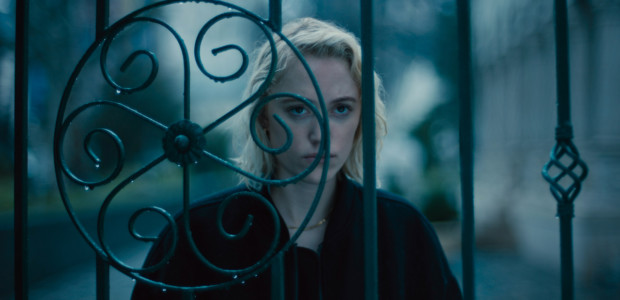Quis Custodiet Ipsos Custodes
The truth of the matter is that it’s virtually impossible to make a wholly original movie. There are only so many variations on plots, with a finite number of technical ways of telling those stories, after a century of cinema from across the world told by all manner of filmmakers. The uniqueness of titles usually lies not in creating something previously unthought of or inventing a new technical approach, but the way the artists synthesize influences, upend expectations, and add their own personal perspectives and aesthetics. It is not hard to discern the forebears of director Chloe Okuno’s WATCHER, but every aspect of the movie is done so well that it never detracts from the engrossing experience.
Julia (Maika Monroe) has moved to Bucharest for her husband Francis’ (Karl Glusman) new job. While Francis is fluent in Romanian, Julia is still learning the language. Julia’s husband works long hours leaving his wife alone for most of the day, familiarizing herself with her new city. She soon believes a neighbor next door is constantly watching her from his window and eventually even progresses to following her through the streets. Julia finds some comfort with her neighbor, Irina (Madalina Anea), but tales of a local serial killer do little to quell her concerns—all while finding little support from her husband, the police, or anyone else as she spirals into an increasingly panicked and isolated state of paranoia.
Director Okuno, who also co-wrote the script with Zack Ford, does little to hide WATCHER’s cinematic DNA. The voyeur aspects of REAR WINDOW and BODY DOUBLE, the devolution into madness of isolated people like THE TENANT, REPULSION, and ROSEMARY’S BABY. The brown color grading of David Fincher’s ouevre dwelling on obsession and encroachment of the sordid. There are also hints of DON’T LOOK NOW with its own tale of an American’s questionable reality amidst murders in a foreign land. Zulawski’s POSSESSION can be seen in the Brutalist architecture backdrop for the emotional distancing of a couple and an unsettling mystery that unfolds around them.
But WATCHER never feels derivative or like simply the sum of its parts. It’s far too masterfully made to be seen as little more than a checklist of influences.
Benjamin Kirk Nielsen’s beautiful cinematography perfectly captures each setting in different tones, whether it’s the fading warmth of Julia’s apartment, the harshness of gray city with its abundance of concrete aesthetic remnants of Soviet rule, to the unforgiving fluorescent lights of a subway station. Combined with impeccable framing and some haunting imagery, Okuno and company fully utilize visuals to tell the story as much as the script and performances.
Monroe further proves that she is an icon of contemporary horror—one that needs to be appreciated now and not 30 years later when folks get nostalgic for her work. Since many of her scenes are alone, or trying to communicate to people that do not speak her language, the actor conveys a terrifically complicated mixture of emotions through subtle changes in facial expressions and physicality. Monroe is able to go from troubled victim to defiant crusader (or from hunted to hunter) without it feeling like a disconnected shift in character; it’s all part of Julia as she navigates the maddening situation that preys on her loneliness and vulnerability.
Glusman also delivers a great performance, walking the difficult tightrope of being supportive but exasperated with the lack of evidence to Julia’s claims. He’s not immediately dismissive nor fully indulgent of his wife’s beliefs. WATCHER does an excellent job of making the gulf that forms between them feel gradual and natural, devoid of the usual outbursts or waiving off concerns.
At the Q & A, Okuno discussed how the film originally took place in New York City/unnamed American metropolis, with Julia moving from a small town. A producer decided on Bucharest for a location, and that proves to be a massive boon for WATCHER. Literally unable to properly express her concerns while utterly lost by what is being said around her underscores Julia’s inability to communicate how she feels or what is happening around her. Furthermore, the new country means ignorance of cultural norms and if it’s her American mentality projecting these events to a land where it would be harmlessly normal. And again the preponderance of Soviet-era Brutalist surroundings makes Bucharest feel totally uninviting, miserably cold, and fairly alien to the American visitor.
Okuno pulls all of these elements together to establish a current of dread that moves between an unreliable narrative and a suffocating nightmare. It’s probably not that hard to discern where WATCHER is headed, with certain sequences being predictable down to their timing in the tale. But Okuno’s debut feature film isn’t about the destination as much as the journey. It expertly switches between sumptuous and bleak imagery, between tender moments and terrifying outbursts, between which version of the story is real that makes it thoroughly engaging. WATCHER is a tremendous achievement that invites viewers into a hall of mirrors that is equally familiar and yet utterly foreign.
Tags: Benjamin Kirk Nielsen, Brutalism, Bucharest, Burn Gorman, Chloe Okuno, Foreigner, Horror, IFC Films, IFC Midnight, Imagenation Abu Dhabi FZ, Isolation, Karl Glusman, Lost City, Madalina Anea, Maika Monroe, Nathan Halpern, Paranoia, Romania, Serial Killer, Shudder, SXSW, SXSW 2022, Thriller, Voyeur, Watcher, Zack Ford


No Comments